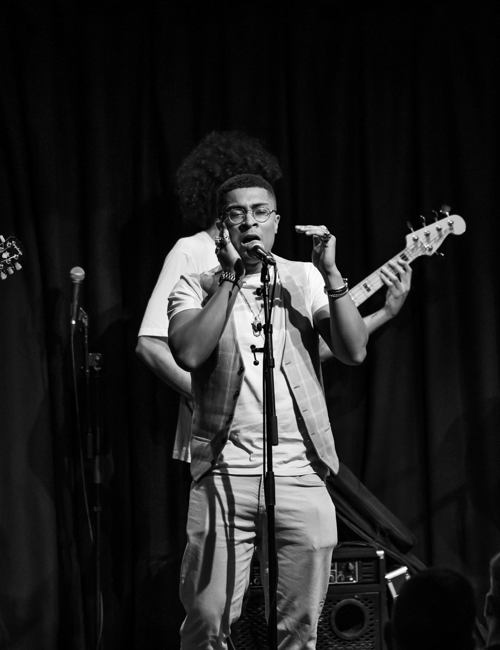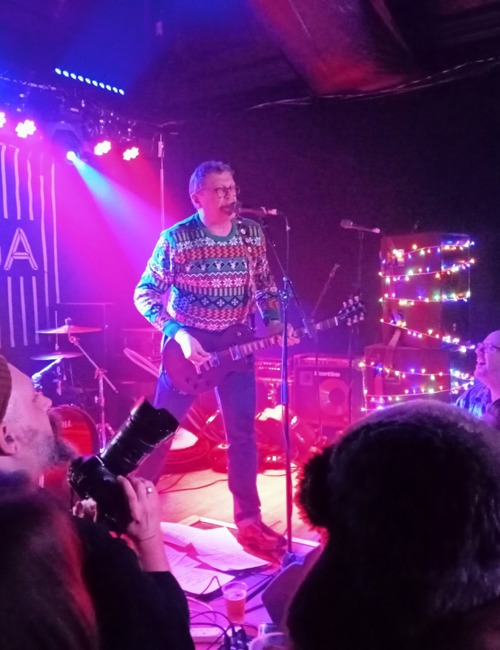Despite its size, Gate To Southwell Festival offers a surprisingly deep and wide array of music and entertainment for all the family, attracting folk and roots artists from all over the world. LeftLion spent Saturday there and came away very impressed...

In a world where gigs and festivals are being postponed or cancelled, the success of smaller independent events is something to be celebrated. Gate To Southwell – taking place only 13 miles from Nottingham – is now one of the UK's leading international roots and folk festivals.
With 50 artists over four days, on four main stages (plus lots of other, more informal spaces), it certainly doesn't feel small. The layout of the site is very clever. An expansive field greets you as you enter, with the main Lakeside Stage straight ahead, and a bar and some food vans to one side. Walk to the left and then behind the main stage and you find yourself led to a whole further world, with merchandise and food vendors, another large bar, and then the Frontier and Folk Stages (the former open and the latter a large tent) situated to either side of the thoroughfare. Those stages are positioned so there's almost no sound bleed, thanks some smart alignment and plenty of bales of hay.

Explore further and you'll find a very generous kids area, an open performance space where Morris dancers and other troupes appear throughout the day, and the Steeples Stage tent.
The festival runs from Thursday to Sunday; I spent Saturday there with my family and experienced a truly eclectic set of artists over just that short period.
I arrived on site just after lunchtime, hearing the harmonies of Campbell / Jensen drifting from the Lakeside Stage as I parked up and was signed in by one of the cheerful and numerous staff.

After bagging a spot under the huge cover which spans the entire stage and gives shelter for several hundred people, the first act I saw properly was The Fugitives: a trio who are more than proud to be from Vancouver ("similar weather", they joke – one of several quips made during the day on the theme of this superb British summer...)
With melodies tinged with melancholy and wistfulness and poignant lines (“Might just rain like this for days” ... "Further on from the heartbreak now, and we’ll see this winter out”) it could be easy for a performance to turn downbeat. But there's an earthy, honest kind of sensibility to The Fugitives, which makes them welcoming, endearing, and overwhelmingly positive. The band rely mainly on fiddle, banjo, bass and acoustic guitar, with the male vocalists exchanging duties. The sound is often pacey, with plenty of harmonies, and a pleasingly rootsy-folk sounds. Despite the chilly breeze and the mainly seated crowd, the band managed to whip up a decent singalong from only their second song.
They're currently touring their new record No Help Coming, which is themed around the climate crisis.


I took the chance to have a bit of an explore of the site, where I happened upon an informal folk-song session in one of the bars, and caught a brief part of the set from Thomas Bradley Project on the grassy Frontier Stage (punchy and pretty addictive folk-rock).
Then it was back to the shelter of the Folk Stage to see Lizzie No, who was also due to play on the Lakeside Stage later in the evening. Artists playing more than one set is an interesting and welcome feature of GTSF, helping you avoid some of the more painful clashes.
Lizzie took to the stage rather hopefully wearing sunglasses, bringing a sense of American warmth to the tent. "We have this thing where it gets warm in July … it’s called summer!" she chuckled, before introducing one number as "a breakup song set during the cost of living crisis in New York City ... Sometimes the love is gone but you can’t afford to move out yet!”
Her themes are very personal and open, with a folk poetic sensibility, but her voice and style wouldn’t be out of place in an alt pop setting: she's chilled and mellow but there's also clear underlying strength to her voice which occasionally surfaced, as she accompanied herself on acoustic guitar or harp.
Deep Well Song was a highlight, written after a tarot session. “Knowing things are going to end badly is oddly liberating," she told us.

Helian arrived next on that stage: a well-received quartet including cello and harp, the vocalist switching to flute about halfway through. They purvey much more trad folk, with a deep sense of ancient knowledge and purity to their music, but also an ability to have fun with it.
Mermaid of Zennor was their retelling of a 500-year-old story: it was quite magical, with the gentle and rich vocal, strong with centuries of tradition. The band demonstrated a subtle and chamber folk style of playing, easily working off each other, and topped with lovely harmonies.
In Garland of England there was plenty of audience participation as they belted out the refrain, “I love my love because my love loves me” – romantic on the surface yet juxtaposed with minor key harp.
Helian are a fabulously accomplished, relaxed and interesting group to listen to, very much keeping the tradition alive and injecting it with real energy, too.



After a slightly longer gap in the timetable (perhaps timed to make sure everyone has chance to eat - very civilsed), Whiskey Moon Face were up. They're an intriguing and pretty unique trio of characters: songwriter Louisa Jones (accordion, vocals, cornet, piano and double bass), Ewan Bleach (clarinet and sax), and Jim Ydstie (vocals, double bass and accordion)
Their songs and presentation is slightly eccentric but thoughtful; slightly ragged at times; very real, yet veering towards dreams. It's Eastern European influenced folk meets New Orleans jazz. Louisa's vocals are dreamy yet slightly husky, bringing echoes of the avant garde and fin de siecle ... like some sort of café vibe from another planet. It was a briliant experience.
Perhaps this band more than any neatly illustrates the eclectic nature of this festival. I'd say it rivals Cambridge Folk Festival, albeit on a much much smaller scale, in terms of the diversity of acts, the ambition of the programming, and the wide definition of folk it encompasses.


The last band I was able to see was Charm of Finches: an Australian duo gathering increasing fame for their delicately beautiful music and very sensitive songwriting.
Their sound is one of ethereal, tight harmonies, the two using their subtly different voices to great effect while working together with relaxed skill and the unique closeness of siblings. They reminded me of an Antipodean interpretation of First Aid Kit, with less Americana and more English folk influences, but soaked with an intangible sense of a different sky, and sometimes even veering towards an 80s aesthetic thanks to the use of piano/synth.
With one in red and one in blue, Ivy and Mabel were a striking presence on stage, but gracious and humble, too.
Middle Of Your Mess was excellent, a song "about a lady that crossed Ivy’s path and didn’t leave a good impression...", and featuring a clever middle-8 section where the timing changed to triplets. And Marlingchen In The Snow, based on a deliciously dark Grimm tale, was haunting yet dimly shining. "It’s not my job to teach you how to be a human" was sung over a shimmery keyboard underlay, the sisters switching vocal leads, creating a reflective and immersive feel.
That was sadly the end to my all too brief experience of GTSF this year – other commitments meant I couldn't stay longer, and I really wished I could, with Rhiannon Giddens headlining later, and many other well-known roots and folk acts appearing on the other days. I've got the date in boldly written in my diary for next year!
We visited Gate To Southwell Festival on 6th July 2024. Next year's festival takes place from 3rd to 6th July 2025.

We have a favour to ask
LeftLion is Nottingham’s meeting point for information about what’s going on in our city, from the established organisations to the grassroots. We want to keep what we do free to all to access, but increasingly we are relying on revenue from our readers to continue. Can you spare a few quid each month to support us?

















